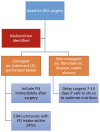Optimizing Inpatient Nutrition Care of Adult Patients with Inflammatory Bowel Disease in the 21st Century
- PMID: 34065070
- PMCID: PMC8151132
- DOI: 10.3390/nu13051581
Optimizing Inpatient Nutrition Care of Adult Patients with Inflammatory Bowel Disease in the 21st Century
Abstract
Malnutrition is highly prevalent in inflammatory bowel disease (IBD) patients and disproportionately affects those admitted to hospital. Malnutrition is a risk factor for many complications in IBD, including prolonged hospitalization, infection, greater need for surgery, development of venous thromboembolism, post-operative complications, and mortality. Early screening for malnutrition and prompt nutrition intervention if indicated has been shown to prevent or mitigate many of these outlined risk factors. There are many causes of malnutrition in IBD including reduced oral food intake, medications, active inflammation, and prior surgical resections. Hospitalization can further compound pre-existing malnutrition through inappropriate diet restrictions, nil per os (NPO) for endoscopy and imaging, or partial bowel obstruction, resulting in "post-hospital syndrome" after discharge and readmission. The aim of this article is to inform clinicians of the prevalence and consequences of malnutrition in IBD, as well as available screening and assessment tools for diagnosis, and to offer an organized approach to the nutritional care of hospitalized adult IBD patients.
Keywords: central parenteral nutrition; enteral nutrition; inflammatory bowel disease; malnutrition; nutrition support; peripheral parenteral nutrition; sarcopenia.
Conflict of interest statement
The authors declare no conflict of interest.
Figures



Similar articles
-
Inpatient Nutritional Considerations in Inflammatory Bowel Disease.Curr Gastroenterol Rep. 2025 Dec;27(1):9. doi: 10.1007/s11894-024-00958-0. Epub 2025 Jan 6. Curr Gastroenterol Rep. 2025. PMID: 39760825 Review.
-
Nutrition Considerations in Inflammatory Bowel Disease.Nutr Clin Pract. 2021 Apr;36(2):298-311. doi: 10.1002/ncp.10628. Epub 2021 Mar 2. Nutr Clin Pract. 2021. PMID: 33651912 Review.
-
Risk Factors for Malnutrition among IBD Patients.Nutrients. 2021 Nov 16;13(11):4098. doi: 10.3390/nu13114098. Nutrients. 2021. PMID: 34836353 Free PMC article.
-
Use and Misuse of Parenteral Nutrition in Patients with Inflammatory Bowel Disease.Inflamm Bowel Dis. 2022 Oct 3;28(10):1592-1602. doi: 10.1093/ibd/izac085. Inflamm Bowel Dis. 2022. PMID: 35472221 Review.
-
GLIM Criteria for Malnutrition in Surgical IBD Patients: A Pilot Study.Nutrients. 2020 Jul 25;12(8):2222. doi: 10.3390/nu12082222. Nutrients. 2020. PMID: 32722435 Free PMC article.
Cited by
-
Mobile-based program improves healthy eating of ulcerative colitis patients: A pilot study.Digit Health. 2023 Oct 11;9:20552076231205741. doi: 10.1177/20552076231205741. eCollection 2023 Jan-Dec. Digit Health. 2023. PMID: 37829613 Free PMC article.
-
Nutrition in Inflammatory Bowel Disease: Strategies to Improve Prognosis and New Therapeutic Approaches.Diseases. 2025 May 1;13(5):139. doi: 10.3390/diseases13050139. Diseases. 2025. PMID: 40422571 Free PMC article. Review.
-
Inpatient Nutritional Considerations in Inflammatory Bowel Disease.Curr Gastroenterol Rep. 2025 Dec;27(1):9. doi: 10.1007/s11894-024-00958-0. Epub 2025 Jan 6. Curr Gastroenterol Rep. 2025. PMID: 39760825 Review.
-
High Red Meat Intake Exacerbates Dextran Sulfate-Induced Colitis by Altering Gut Microbiota in Mice.Front Nutr. 2021 Jul 20;8:646819. doi: 10.3389/fnut.2021.646819. eCollection 2021. Front Nutr. 2021. PMID: 34355008 Free PMC article.
-
Optimizing Nutrition to Enhance the Treatment of Patients With Inflammatory Bowel Disease.Gastroenterol Hepatol (N Y). 2022 Feb;18(2):95-103. Gastroenterol Hepatol (N Y). 2022. PMID: 35505813 Free PMC article.
References
-
- Ng S.C., Shi H.Y., Hamidi N., Underwood F.E., Tang W., Benchimol E.I., Panaccione R., Ghosh S., Wu J.C.Y., Chan F.K.L., et al. Worldwide incidence and prevalence of inflammatory bowel disease in the 21st century: A systematic review of population-based studies. Lancet. 2017;390:2769–2778. doi: 10.1016/S0140-6736(17)32448-0. - DOI - PubMed
-
- Frolkis A.D., Dykeman J., Negrón M.E., deBruyn J., Jette N., Fiest K.M., Frolkis T., Barkema H.W., Rioux K.P., Panaccione R., et al. Risk of Surgery for Inflammatory Bowel Diseases Has Decreased Over Time: A Systematic Review and Meta-analysis of Population-Based Studies. Gastroenterology. 2013;145:996–1006. doi: 10.1053/j.gastro.2013.07.041. - DOI - PubMed
Publication types
MeSH terms
LinkOut - more resources
Full Text Sources
Medical

